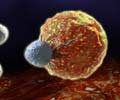Somatic mutations identified in mature cytotoxic CD8+ve T-cells clones in rheumatoid arthritis could be involved in its pathogenesis.
- Accumulation of somatic mutations within cells is known to contribute to the development of cancer by causing their unregulated proliferation.
- Current study suggests that a similar mechanism of somatic mutations in mature effector T-cells might also be associated with the development of autoimmunity.
- Rheumatoid arthritis has often been found to occur in LGL leukemia, a type of lymphoproliferative disorder.
- Studies have shown that expanded clones of CD8+ve T-cells in LGL leukemia show STAT3 (Signal transducer and activator of transcription 3) gene mutations.
- The incidence of rheumatoid arthritis (an autoimmune disease) in LGL leukemia patients with STAT3 gene mutation was 43% compared to only 6% of patients who did not have the mutation.
- This association between LGL leukemia and rheumatoid arthritis raises the possibility that CD8+ve T-cell clones harboring somatic mutations could contribute to autoimmune disease.
Testing for Mutations in Rheumatoid Arthritis Patients
- The study included 80 newly diagnosed rheumatoid arthritis patients and 20 healthy controls.
- Blood samples of both the patients and the controls were analyzed for the presence of mutations by employing the latest sequencing techniques.
- 20 percent of the patients showed somatic mutations of genes affecting immune function and cell proliferation in contrast to just 1 among the control group.
- All the mutations were found in cytotoxic CD8+ve clonal T-cells associated with rheumatoid arthritis; the CD4+ve helper T-cells did not demonstrate any mutations.
- The mutations were permanent i.e. the same mutations and identical clonal T-cells were found in the patients several years after the initial finding.
Scope of the Study and Future Plans
- The significance of these findings is not yet clear. More research is required to validate the role of mutations in effector T-cells and the mechanisms involved in the development of rheumatoid arthritis or similar autoimmune disease. Nevertheless, this study has demonstrated a connection between somatic mutations and a non-malignant autoimmune process.
- The study findings suggest that chronic inflammatory conditions such as rheumatoid arthritis may predispose to the accumulation of somatic mutations. In future, the study team plans to analyze similar mutations in other chronic inflammatory diseases.
In conclusion, the idea of mutations leading to autoimmunity is indeed novel, and only time will tell whether this hypothesis proves to be a game-changer in the way autoimmune diseases are approached in the future.
Reference:
- Somatic Mutations in Clonally Expanded Cytotoxic Lymphocytes in Patients with Newly Diagnosed Rheumatoid Arthritis - (http://acrabstracts.org/abstract/somatic-mutations-in-clonally-expanded-cytotoxic-lymphocytes-in-patients-with- newly-diagnosed-rheumatoid-arthritis/)













